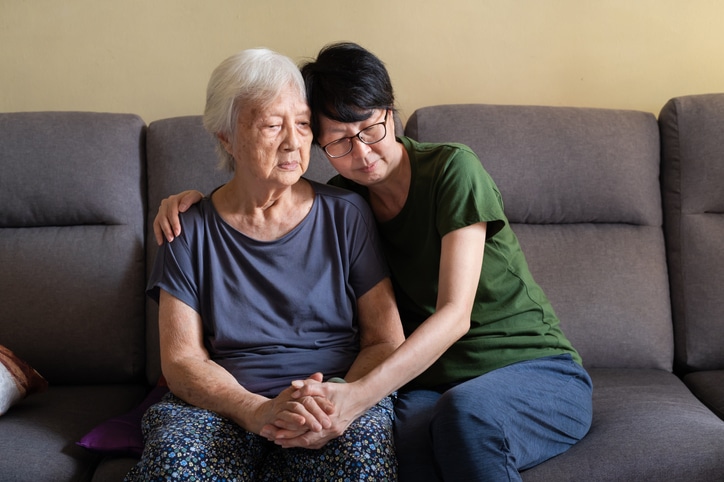Why Dementia Care At Home Can Be So Difficult

As dementia is a progressive disease, the initial stages can be quite manageable. As the disease inevitably advances, however, caring for your loved one at home can become increasingly difficult. Senior caregiving is a full-time commitment in itself and can become incredibly stressful especially if you are working a full-time job, have little experience with memory disorders, or if you are busy caring for your own family of little ones. In order to balance in-home care duties with your own life, you will need a network of support. Here’s some of the challenges that in-home memory caregivers commonly face, and signs that it may be time to consider an alternative solution for your loved one with dementia.
- Safety and security – People with dementia can become frail, confused, and wander out of a safe space. Making the home more secure is the first challenge, and that can mean improving lighting, eliminating fall risks, and putting up pictures or clear signs to label where things are kept. You may also want to consider a wearable health monitor and GPS tracker for your loved one.
- Eating – As the disease progresses, caregivers need to encourage a healthy diet and watch for signs that swallowing and chewing is becoming more difficult. This can mean amending their diet to include smoothies and protein drinks, and monitoring eating more closely.
- Toileting – In later stages of this memory condition, your loved one may not be as aware of when they need to go to the toilet or they may forget where the bathroom is. Incontinence can be a challenge, as can an inability to remove clothing in time to relieve themselves.
- Aggression – Frustration, confusion, stress, and agitation can easily lead to aggressive behaviors, which are often upsetting and difficult for families to manage. Having a set routine, promoting healthy sleep and gentle exercise, and massage can help relax your loved one.
- Isolation – When your loved one has dementia, it is easy for you as a caregiver to become isolated as their care needs grow more demanding. Neglecting important relationships, feeling depressed, and lonely are common challenges for caregivers and can easily lead to burn out. Having time and space for self-care is critical for all caregivers, but especially for those people caring for people with dementia.
- Adaptability – While routine is an essential part of dementia care, it’s also important to be very flexible, which can be a big challenge. Caregivers need to be able to quickly pick up on changes in mood, physical health, and mental health to adapt their day and the environment to provide the right level of support. This is very intensive, especially as the condition advances and it becomes more difficult for your loved one to communicate with you.
- Awareness and education – Unless you have dementia caregiving experience, it is very challenging to manage on your own and learn as you go. Be sure to access all the resources in your network to manage your expectations of caregiving responsibilities, how the disease progresses, and tips on how to manage challenges. Local home health aides, support groups and medical resources can provide practical insight as well as a helping hand.
- Planning for the future – When it comes to dementia, caregiving needs to be more than “one day at a time,” and caregivers need to constantly plan for the future. Asking yourself the difficult questions about what you can do and how you can support your loved one through the more advanced stages of dementia isn’t easy, but it is essential to helping you cope. It’s important to realize your personal limitations and know that help is always available from professionals. Having an in-home caregiver assist you not only helps you provide the best possible care but allows you to spend quality time with your loved one.
UMC HomeWorks Memory Care – In the Comfort of Home
Are you caring for a senior with dementia at home? We’re here and ready to help you face all the challenges ahead.
UMC HomeWorks is a leading senior care program specializing in at-home care for elderly in New Jersey. In addition to assisting with daily tasks, errands and light housekeeping, our home health aides are also qualified to provide specialized assistance and skilled nursing care, including at-home memory care for seniors with cognitive health challenges like dementia and Alzheimer’s disease. Our Tapestries At Home program is founded not only on supporting the safety and physical health of seniors, but also on creating an enriching care environment that values each person’s dignity and quality of life.
If you would like to find out more about respite and full-time in-home memory care with UMC HomeWorks, please contact us today or visit our website at: https://umcommunities.org/homeworks/tapestries-memory-care-at-home/






